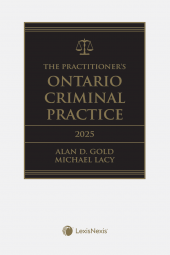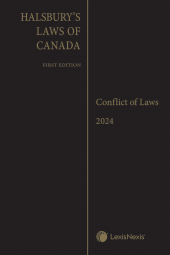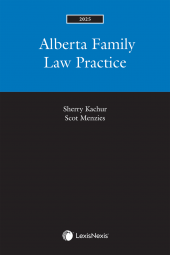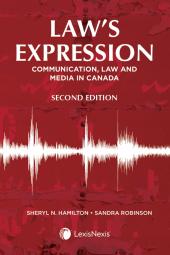Law's Expression – Communication, Law and Media in Canada, 2nd Edition
Freedom of expression has become a central dimension of our increasingly fractious political and social climate – this volume critically analyzes the stakes of communicating in public in a modern democratic society.
One Year Subscription Only Terms
Subscribers receive the product(s) listed on the Order Form and any Updates made available during the annual subscription period. Shipping and handling fees are not included in the annual price.
Subscribers are advised of the number of Updates that were made to the particular publication the prior year. The number of Updates may vary due to developments in the law and other publishing issues, but subscribers may use this as a rough estimate of future shipments. Subscribers may call Customer Support at 800-833-9844 for additional information.
Subscribers may cancel this subscription by: calling Customer Support at 800-833-9844; emailing customer.support@lexisnexis.com; or returning the invoice marked 'CANCEL'.
If subscribers cancel within 30 days after the product is ordered or received and return the product at their expense, then they will receive a full credit of the price for the annual subscription.
If subscribers cancel between 31 and 60 days after the invoice date and return the product at their expense, then they will receive a 5/6th credit of the price for the annual subscription. No credit will be given for cancellations more than 60 days after the invoice date. To receive any credit, subscriber must return all product(s) shipped during the year at their expense within the applicable cancellation period listed above.
Product description
This highly anticipated and compelling second edition of Law's Expression – Communication, Law and Media in Canada provides a timely analysis of the intersection of law, communication and media in contemporary Canadian society. In an era where freedom of expression and free speech frame some of the most important issues facing governments, regulators, media owners, and citizens alike, this book offers valuable tools for understanding and critical evaluation.
Framed through freedom of expression, the authors tackle the areas of privacy, reputation, hate speech, sexualized speech, and intellectual property, situating them in their historical, legal and social contexts; providing key theoretical constructs with which to make sense of them; and drawing out the particular challenges posed by digital media and online communication.
Featuring New Content
The second edition offers up-to-date information and uniquely Canadian case studies. It illustrates concepts using popular culture references making it an engaging and informative read for all audiences.
This accessible text demystifies the legal dimensions of free expression and free speech, discussing foundational concerns and emerging topics, including:
- The challenges in negotiating the line between what constitutes private and public communication;
- Key perspectives on privacy, surveillance society, and laws governing the collection, storage, use and dissemination of personal information;
- The careful balance between the right to express oneself freely and a person’s right to their reputation, as well as the possibilities and limits of the law in protecting that reputation;
- The testing and selective reinforcement of limits on expression through the censorship and regulation of obscene and indecent conduct and content;
- The proliferation of hateful speech in contemporary discourse and the challenges of regulating that through criminal and human rights law, particular in the digital era; and
- The increasing trend towards the “propertization” of certain forms of expression and the very building blocks of communicative practice through intellectual property laws.
Invaluable Insight
With its accessible style, critical perspective, and synthetic approach, Law’s Expression – Communication, Law and Media in Canada, 2nd Edition will be a valuable addition to the bookshelf of any communication scholar, media studies student, journalist or journalism student, law and legal studies majors, sociologists and sociology students, government analysts, constitutional law and human rights lawyers, and all those who seek to broaden their understanding of the changing landscape of communication in a digital era and the ways the laws governing free expression are used to navigate those challenges.
Table of contents
Chapter 1: Freedom of Expression and its Limits in a Media Society
1. Introduction
2. Why do we protect freedom of expression?
3. Canada’s legal framework for protecting freedom of expression
4. Freedom of the press
5. Regulating expression
6. How do we justify regulating expression?
7. Regulating expression in the contemporary mediascape
8. Conclusion
Chapter 2: Privacy
1. Introduction
2. Frameworks for thinking about privacy
A. The terrain of privacy: books, bootleggers, bodies, and blood
B. Informational privacy: emanation, detection, and telecommunication
3. Navigating the data maelstrom: privacy as control
4. Privately visible and publicly transparent: balancing privacy and surveillance
5. Conclusion
Chapter 3: Regulating Reputation
1. Introduction
2. Reputation and defamation
A. Primary defences
i. Justification
ii. Qualified privilege
iii. Fair comment
iv. Innocent dissemination
v. Responsible communication on matters of public interest
B. Cyber-libel
C. Managing and maintaining reputation
3. Conclusion
Chapter 4: Expressing Sex
1. Introduction
A. Obscenity
B. Child Pornography
C. Criminalized expression
D. Obscenity in the post-Butler years
E. Images in circulation: censorship, cyberbulling, and ‘sexting’
2. Conclusion
Chapter 5: Hateful Communication and Hate Speech: Criminalizing Expression
1. Introduction
2. Defining hate, hate groups, and harm
3. Criminalizing expression
4. Hate speech in the Criminal Code of Canada
5. Hate and human rights
6. Hate online
7. Conclusion
Chapter 6: Propertizing Expression: Intellectual Property
1. Introduction
2. Defining, justifying and critically engaging intellectual property
3. Canadian copyright legislation
4. Copyright in the courts
5. Canadian trademark legislation
6. Trademarks in the courts
7. Conclusion
Chapter 7: Conclusion: Resistance and Resilience
Related products
-
New!Preorder
 The Practitioner's Ontario Criminal Practice, 2025 Edition + E-BookNew!Release date: December 31, 2024$140.00
The Practitioner's Ontario Criminal Practice, 2025 Edition + E-BookNew!Release date: December 31, 2024$140.00 -
New!Preorder
 Halsbury's Laws of Canada – Conflict of Laws (2024 Reissue)New!Release date: November 29, 2024$335.00
Halsbury's Laws of Canada – Conflict of Laws (2024 Reissue)New!Release date: November 29, 2024$335.00 -
New!Preorder
 Alberta Family Law Practice, 2025 EditionNew!Release date: November 29, 2024$175.00
Alberta Family Law Practice, 2025 EditionNew!Release date: November 29, 2024$175.00
 Lexis Nexis
Lexis Nexis 
